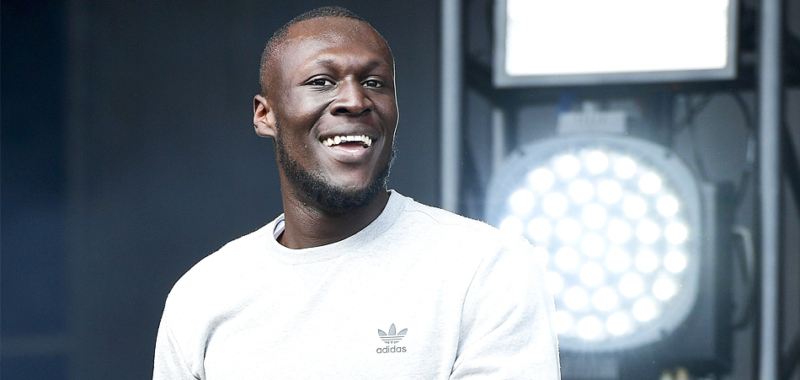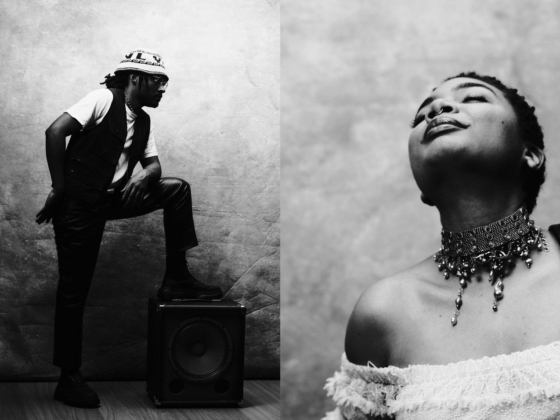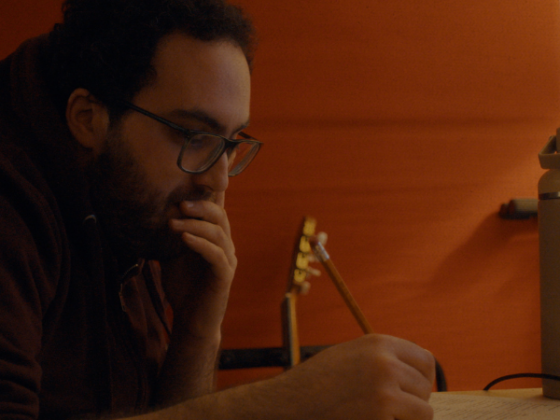Unwittingly or not, 23-year old South London MC Stormzy (née Michael Omari) has become one of the poster boys for the current commercial rebirth of Grime in the UK. Having recently released his debut album Gang Signs & Prayer to almost universal acclaim, he seems poised to become the bridge between the movement’s underground roots and its newfound popular appeal. Grime itself is multi-faceted with an intricate backstory, but the strain that’s currently the object of so much hype is generally accepted to have mutated from UK garage sometime in the mid-2000's. It’s known for pummeling basslines and a broad, cross-disciplinary futurism.
Grime is as much animated by its vehement production strategies as it is by its socio-political subjects; the skittish beats often propping up lyrics that deal frequently and explicitly with themes like British structural racism, the cultural-economic dislocation of the urban working-class, and just more generally with the experience of being human in the ashen hellscape of 21st-century late capitalism. People are flocking to it because it feels like a genuine cultural force – political without being preachy, ‘meta’ without being cynical, zeitgeisty without being alienating. This explosion has been a long time coming, though. It’s worth noting that artists like Tinchy Stryder and Dizzee Rascal prove that grime has been a steady element in the UK pop ecosystem for years now, as opposed to a reductive view held by many that the genre abruptly appeared one day, Arrival-style, inscrutable and weightless on the horizon.
Stormzy’s album has confounded some because in lieu of a collection of bangers he's delivered something more nuanced – a mosaic of different inspirations and approaches. Gang Signs & Prayer was mostly produced by Fraser T Smith, whose CV consists of trivial chart-pop in the vein of Adele, but whose inclusion here makes perfect sense considering Stormzy’s ambitions to widen Grime’s appeal. The genre’s familiar features (volatile percussion, frosty atmospherics) are still present, but there’s also a vivid desire for sonic evolution. The opener, "First Things First", is a fiery and forthright declaration of intent. Bracketed by portentous storm clouds and a fluctuating beat, Omari takes aim at racist nightclub door policies, backbiting MCs and eruptions of street violence (“There’s riots in the city, just tell me where I sign up”).
Stormzy’s intimation of the 2011 London riots is no accident, given that Grime's emergence has always been linked to extant material conditions in the UK. The Conservative government in Britain even tried to clumsily absorb its rejuvenation into their agenda – further proof, if anything, that there’s virtually nothing neoliberal ideologues won’t try to taint. Absurd attempts have been made to re-engineer the genre's developmental significance as being somehow illustrative of the Tory success narrative – after Skepta won the 2016 Mercury Prize (for the striking Konnichiwa), the Conservative Party’s culture lizard Matt Hancock claimed that Grime represented “modern Britain…the entrepreneurial, go-getting nature”. He also counted himself and his staff among the album’s fans, yet was curiously unable to name a single track from it.
Unsurprisingly, the standout tracks on GS&P are those where Stormzy grooves in full, breathtaking braggadocio mode. The hardened lyricism of tracks like "Return of the Rucksack" or "Mr Skeng" (where he brashly confronts his detractors – “They said Stormzy can’t be the king of grime.”) are infectious, as is the two-punch menace of "Cold" and "Bad Boys". Lead single "Big For Your Boots" features the production talents of grime royalty Spyro (his minimalist beat all hissing percussion and chopped vocals), who provides shrewd ballast to Omari’s mercurial flow & scampish charisma. Similarly on "Shut Up" (originally released in 2015 but already a classic), where Stormzy’s confrontational éclat merges effortlessly with the diffuse production. It’s hard not to get swept up in Omari's bracing presence and those byzantine verses, even if the integration of social media vernacular at times verges on the gratuitous.
What’s interesting about the album is that it signals a possible evolution for the genre beyond the confines of 140bpm. The classically zealous roof-raisers are tempered throughout by more subdued offerings. "Blinded By Your Grace", Parts 1 & 2, take cues from the postmodern gospel-revivalist instincts demonstrated by Chance The Rapper and Kanye West on their respective LPs from last year – all expansive soundscapes and dulcet vocal textures. Tracks like "Velvet" and "Cigarettes & Cush" draw on the production methods of conventional R&B – where, instead of tightly wound bars or amphetaminic beats, rich & melodic arrangements are foregrounded and given room to breathe. Stormzy isn’t afraid to indulge his sentimental side, either – see "100 Bags", a touching yet sprightly hymn to his mother and her central role in his upbringing. Like his peer Kano, Stormzy has learned to colour his swagger with introspection. Just look at album closer "Lay Me Bare" – where, framed by mournful piano, he uncompromisingly addresses many of his personal demons – among them his prickly relationship with his father.
Many view Stormzy as a signifier for a new model of capital-G Grime. It’s natural for a genre to experience an identity crisis during a rapid expansion of its audience, and Grime’s crisis of this nature has been particularly acute. The slow-burning cultural anxiety within Grime circles generated by the genre's recent acclaim mostly draws from the fact that it isn’t in the strict sense new – it’s a music with a rich, complex history, which is why some tastemakers are suspicious of its swift embracement by mainstream figureheads. The groundwork laid years ago by the likes of Wiley, Young Dot and Neckle Camp is now being built upon by a new crop of artists like Novelist, Skepta, Visionist, Kano and, of course, Stormzy himself. Purists are concerned about the current sonic direction of the genre, given that these young guns are embracing creative techniques and production approaches that have often been consciously rejected in the past. Stormzy’s vision of Grime is indeed an expansive one: he’s an artist who not only welcomes but actively subsumes the effect of populist sensibilities, whether that be through the album’s covert Lily Allen cameo or his public friendship with twee homunculus Ed Sheeran. During one interlude on GS&P, Crazy Titch – a distinguished Grime MC in his day, now serving a life sentence for murder – appears through the hip-hop trope of the phone call skit as a kind of cross-generational phantom. He gives Stormzy his unreserved artistic endorsement, compares him to Neo (the protagonist from The Matrix), asserts that “this kid has to be seeing the game in ones and zeros”, that he’s going to take grime “from a second-rate genre to a first-rate genre”. This sense of Stormzy as some sort of Grime-Christ-figure is only amplified when you look at the Last Supper allusion that graces the album cover.
Some of Grime’s more distinguishable cultural features are that it’s (relatively) new, aggressively temporal and profoundly British with some unmistakable influence from Jamaican sound system culture; which is why one of the strangest aspects of its rise has been its almost cynical exclusion from the ivory tower of the British music industry. Establishment recognition of the genre in the UK has been either piecemeal, or simply non-existent. One of the only substantive platforms afforded to it recently came via Kanye West’s fiery performance of "All Day" (which featured a glittering roster of Grime MCs, Stormzy included) at the 2015 BRIT awards – a Lacanian rupture in the fabric of British bourgeois tastes that prompted over 100 Ofcom complaints about broadcasting standards. Skepta excellently tackled these frivolous anxieties on “Shutdown”, a track he rushed out several days after the BRITs performance, which featured a soundbite of a woman complaining over the phone about “a bunch of young men all dressed in black, dancing extremely aggressively on stage…it made me feel so intimidated and it’s just not what I expect to see on primetime TV”. Skepta snarling “I’m in a different class” in the following verse says it all.
The BRITs, an annual awards show held by the British Phonographic Industry (Ltd.), are ostensibly intended as an endearingly kitschy celebration of new British music. It’s just a shame that, along with their more lavish analogue in The Grammys, they’ve shown themselves to be part of an endemic industry failure to formally recognise black artistry. It’s difficult not to sympathise with the structural concerns voiced by Grime’s advocates when you actually watch footage of this year’s awards. While featuring Skepta and Stormzy, their appearances felt perfunctory. Instead of appreciating one of the most exhilarating artistic developments to occur on the island in years, the ceremony instead opted (as it almost always does) for feverishly white interlude-banter, crypto-fascist celebrity worship and garish live performances containing more pointless twists and turns than a Steven Moffat script. This year’s low point was probably haggard establishment ghoul Simon Cowell drawing out the announcement of One Direction’s win for Best British Music Video – pompous smirk smeared across his jaw, basking in the latency of his power like a psychotic Roman emperor.
A working theory behind Grime's systemic exclusion is that it threatens old industry paradigms. Stormzy rose to prominence in stunningly DIY fashion – singles, low-budget videos, promotional mastery – that triumphantly culminated in every single track on his album entering Spotify's Top 50 streaming chart simultaneously. Almost all of the contemporary breed of grime artists are – in every sense of the word – independent. Grime's idea of resistance to repressive power dynamics isn't irony or disengagement, but solidarity, or that old aesthetic chestnut of earnestness. For now, Stormzy is compelling because he embodies of one of Grime’s central aporias – its thorny relationship with ‘authenticity’. Yet, his confident debut finds him looking to the genre's future, while deftly occupying the liminal field between cherished underground artist and the more mainstream archetype of MC-qua-pop star. For someone wearing a crown, he's got his head held pretty high.









